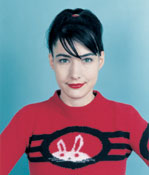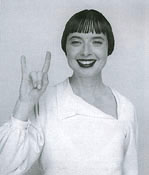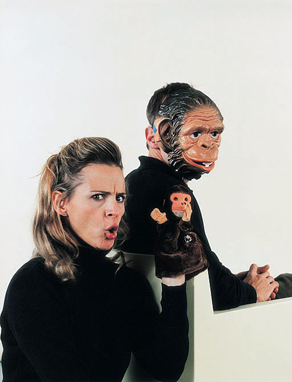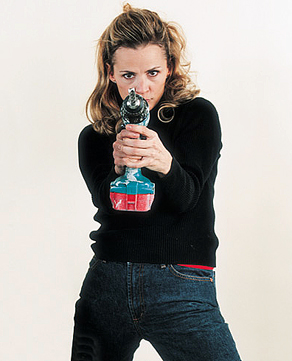 |
  |
 |
  |
 |
 |
| |

Read Bjork's2001 interview with Juergen Teller from the index archives. |

|
 |

Kathleen Hanna discusses writing and making music in this interview from 2000 with Laurie Weeks. |
|
 |
|
 |
|
|
 |

Isabella Rossellini spoke with Peter Halley in this 1999 interview. |
|
 |
|
|
 |
 |
|
Alexander McQueen's 2003 interview with Bjork. |
|
 |
|
|
 |
|

|
| Amy and David Sedaris, 2001
WITH STEVE LAFRENIERE
PHOTOGRAPHED BY LEETA HARDING |

The first time I saw David Sedaris, he was sitting on my friend Wendy's couch eating an enormous piece of birthday cake in between tokes off the crooked Easy Rider joint seemingly stitched to his left hand. It was 1985 and he'd come to Chicago from North Carolina to attend the School of the Art Institute. People had been telling me about the sculptures he made — wind-up balsawood hearts that creeped around on wire legs or buzzed sullenly in your hand. But when I brought them up that afternoon, he changed the subject abruptly — to Joyce Carol Oates. I listened, but it was hard to tell if he admired or pitied her, though I do remember becoming increasingly mesmerized by his voice. At once potent and childlike, it made me focus so much on his mouth that I lost track of what he was saying. Charmed.
Pretty soon we were pals and drifting around Chicago's performance scene, an odd smorgasbord of balls-out satire, improv comedy, experimental theater, and drag. To us it was just an excuse to mount our own nutty three-hour variety shows — extravaganzas with titles like Puffy vs. Puffy. We liked the format, as it was the best way to showcase scads of local extremists and friends. It was around this time that David began to read the short stories he'd been tapping out on his old Corona. These, as you might guess, left our audiences in fits.
When his younger sister Amy moved to town, they decided to christen themselves The Talent Family and become playwrights. The resulting plays were so gob-stoppingly funny that within two years The Talent Family had relocated to New York and were selling out theaters and scooping up Obies. Amy's performances in particular were singled out for feverish praise. It led to a variety of offers, and eventually to her hit Comedy Central TV series, Strangers with Candy.
David's certainly been no slouch, with four best-selling books, and now a movie in the works. When I asked for a Talent Family interview for our fifth anniversary issue, he was just coming off a grueling six-week lecture tour. It was Amy who suggested that we do it over a home-cooked meal at her house. That perked him right up.
STEVE: I'll bet you put on some interesting shows in the backyard when you were kids.
AMY: Backyard, basement, beach. Our grandmother was in a convalescent home, and we did shows there to entertain the old people. David would tell us to go out and "knock 'em dead." [laughs]
DAVID: For the talent show in third grade, I did a skit with Brian Cox. He's the weatherman, and I come on and say, "You said that yesterday it was supposed to rain and snow, and it didn't." And he says, "Yeah? Well here's your rain," and he throws some water on me, "And here's your snow," and he throws something else. And I thought, "That's amazing! You could build some songs around that and make a show!"
AMY: I was still a Girl Scout in my senior year in high school. I was geeky.
DAVID: Then one day I heard that Amy was going to audition for a play at the Raleigh Little Theater. No one in our family expected this. But she must have been thinking something when she rocked in her bed, listening to those Barbra Streisand albums.
AMY: That he bought me. [laughs]
DAVID: So I go to the Raleigh Little Theater, and Amy gets up and sings "Cabaret." And I mean, the dream would be, "Oh my god, she can really sing!" Instead I thought, "Oh my god, she'll do anything!"
AMY: David always did characters around the house, so I picked up on that and decided to perform. It just seemed like something to do.
STEVE: And you ended up with a TV series.
AMY: Well, that kind of fell into my lap. When I first came to New York to do one of our plays, I didn't expect anything like that. It was just offered. Someone interviewed me on the set of Strangers with Candy recently, and at one point they asked, "Well, was this your dream, doing a TV show?" I felt terrible telling them, "No, it wasn't my dream." I mean, I love doing it, but I came here to work on our plays. Everything else is just extra.(She slips into the kitchen, and returns a minute later carrying heaping plates of baked potatoes, baby peas, and steak. She also sets down a dish next to me with butter, fresh chives, and sour cream.)
STEVE: Yow. This is my favorite food in the world.
AMY: Oh, me too.
STEVE: I like to put as much butter as I can on everything. Did you have to eat at a lot of Bennigan's and Applebee's on your tour, David?
DAVID: Yes. For our next play, I like the idea of a chain restaurant called Shenannigan's.
AMY: I love that. "John Merrick, party of one. Ha-ha!"
DAVID: I went to the Macaroni Grill, which is this chain Italian place. When you get on the waiting list for a table, they give you a pager that vibrates.
STEVE: Oh, so you can go shopping at the other chain stores in the mall.
DAVID: Yeah, or head over to Shenannigan's to see if a table's ready there. But at Macaroni Grill, it's as if they're required by law to fuck with you. Like, "How's that salad treating you, big guy?" The hotels are so bad now, too. At a Sheraton in Missouri there was a portable TV in the bathroom sitting in a pool of water on the sink, with the antennae broken. As if someone had brought it from home and just left it there. [laughs]
STEVE: You kept your waitress job in the East Village until recently, Amy. Do you ever think about going back?
AMY: Oh, sure. Actually I'd love to work at Magnolia's, that little bakery down the street here. My dream is to own something like that one day. Everyone in my family cooks and bakes, so I'd love to own a bakery. Actually, a bakery, a wig shop, and a theater — my own little strip mall with just those three things.
STEVE: Or just have them all in one shop.
AMY: "Waitress, there's a hair in my ... " "Whaddya want, it's a wig shop."
DAVID: "Would you care for a bun?"
AMY: "We braid our breads!"
STEVE: I just saw your makeover as Angie Dickinson in the new Kevyn Aucoin book, by the way.
AMY: Isn't it great? I was sitting in the chair, and he was pulling my hair back, so he'd have a smooth surface to work with. And I go, "I have an obsession with Angie Dickinson." The next thing I knew, I had turned into her.
STEVE: It's funny, because I saw Burt Bacharach getting into a limo a few weeks ago. He looked almost elderly, and I suddenly found myself worrying what Angie was looking like!
DAVID: Last year, I was outside Orly Airport, waiting in the taxi queue while Hugh got the luggage. While I'm standing there, the door opens and Keith Richards comes out, gets into a car, and drives off. A few minutes later Hugh runs out and says, "Guess who was just at the luggage carousel? Mary Tyler Moore!" So it hadn't been Keith Richards after all.
AMY: [laughing] Oh my god.
STEVE: Amy, was there any censorship from Comedy Central on Strangers with Candy?
AMY: Yes, but it was weird. Like they let you say "pussy," but not "faggot" — until the fourth show. They said, "You have to build up to 'faggot.'" And the script of one show had me writing in my "dirty, filthy Jew diary." Well, I could say "dirty," but I couldn't say "filthy." It was killing me.
STEVE: Did you shoot it here?
AMY: New Jersey. We found this old public library and made it into the school.
STEVE: That episode where you shoot up the girl's track team with steroids, and you all start to grow beards ...
AMY: Oh god, I looked like Sean Penn! It was horrible to shoot, though. That fatty suit, and the beard, and I had to run.
STEVE: How many episodes are there?
AMY: Thirty.
STEVE: You co-wrote, co-directed, acted in, and edited thirty episodes in, what, 18 months? That's insane.
AMY: I know. I was exhausted.
STEVE: Well, everyone I know is addicted to it.
AMY: And here I sit on a Saturday night. (Jerri Blank rueful look.)
STEVE: Do you ever get tired of doing Jerri?
AMY: No. She's in all the Talent Family plays — that character. I always consider her like one of those actresses that aren't versatile, you know? They're always the same in everything. I think it'll be interesting if she's in the next one, though, because I've been doing her for so long, and now she's even been on TV.
DAVID: Aren't you writing a TV show now, Amy?
AMY: No, we're not doing that. We were going to do something with Fox.
STEVE: Well, then, what about a film project for the Talent Family?
DAVID: Wayne Wang, who did Smoke, is making a movie from four stories in Me Talk Pretty One Day. But, really, it's just one of those things I had never considered. Like, "What if I de-clawed a kitten?" But I like Wayne Wang a lot. So I said, "Okay, I'll do it if Jack Lemmon plays my father."
STEVE & AMY: Wow!
DAVID: And I would love Elaine Stritch as my mother. But apparently she is super-difficult and a little too old. I just don't want anything to be expected of me in any way whatsoever. I mean, even when our plays are on videotape, they just look wrong, I think. It looks so sad.
STEVE: Certain stories could work, though. The one you wrote for Esquire about your brother, "You Can't Kill the Rooster."
AMY: "The Rooster" is a good story.
STEVE: Did Paul actually say to your father, "What you need is some pussy, motherfucker."?
DAVID: Yes. But Paul is ... like one time Paul wanted to eat some chicken wings at three o'clock in the morning, but they were frozen. So he leaned the package at an angle against the wall and stepped on it, threw the wings in his toaster oven and cooked them. But they had freezer burn, so he only ate about half of them, and he took the rest outside and threw them in the garbage can. An hour later he was in his underpants in the back yard pulling them out. That's Paul.
STEVE: I've seen you read "The Rooster." It sort of stuns audiences.
DAVID: Well, Paul calls everybody "nigger." I sent the story to my dad and Paul before it came out, and Paul was fine with it. But my dad made a good point. The story is very clearly set in North Carolina, so if Paul calls everyone "nigger" they're going to think he's a redneck. Anywhere else in the country and they would just think, "Oh, he listens to a lot of rap music."
STEVE: Do you ever get booed?
DAVID: I just spent a month being hissed for using the word "pussy" on stage. I tell a story about getting into a cab in Chicago and the driver asking, "What's your name?" I say David, and he says, "Hey, Dave, see any pussy out there tonight? There's a lot of pussy further south on Montrose, but a lot of that is sick pussy. I know where there's some nice pussy, and I'm pretty sure it's wide awake and rarin' to go." All I could envision was this vagina moving independently of its owner. It's going to rent an apartment, and ... "I know I put those references here somewhere." Anyway, I think a hiss is a wonderful response.
STEVE: I can never remember, what's the order of your siblings?
DAVID: My sister Lisa, then me, then Gretchen, and then Amy, then my sister Tiffany, and my brother Paul.
STEVE: Was it Gretchen who always set the standards? Like what music was cool ...
DAVID: Gretchen glued an Al Green record to her turntable. The one that had "Let's Stay Together" on it.
STEVE: No she didn't.
DAVID: Yes she did. She just put other records on top of it. That way she figured it would always be there. Our dad only listened to jazz. Actually, it wasn't until we left home that we first met anyone who listened to music by white people. And I'm still amazed by that. Hugh will put something on, and I'm like, "Hugh, they're ... white."
STEVE: You only heard black music growing up? Not even country?
AMY: A little. My mom used to take me to airports and I'd sing country songs to people getting on the airplanes.
STEVE: It's like you've always been in your own movie, Amy. [laughs] I was remembering the other day what a hard time you'd give David's boyfriends.
AMY: Oh, we loved to embarrass them. Sometimes David would come to the beach house in the summer. The first time he brought a guy along, we were all doing things like — when he'd come out of the bathroom we'd be like, "Jesus Christ, Chuck! Open a window, would you?" Or at the dinner table he'd suddenly realize that we were all wearing his clothes. And if he said anything even slightly rude to me, I'd act real upset, run up the stairs, and slam the bedroom door. (laughing) That was a hilarious weekend.
STEVE: So the Talent Family play opens in March ...
DAVID: If you have any ideas, write them down. (laughs) I get asked about that — "Are you guys doing a play? What's it about?" I say I have no idea. It always gets a big laugh, and I think, is that strange? Because we never know. Real playwrights start months, or even years, in advance, but I don't want to be a real playwright. I think of these more as shows.
STEVE: Skits.
AMY: Snippets — we just do the best parts.
DAVID: We always go into it with some kind of script, and the actors read it, then we throw it away. We ask them, "What would you like to do? Would you like to dance? Would you like to sing? Are there any words you'd like to use?" And then we just rewrite it especially for those actors. I don't know how playwrights just write a play and send it off into the world. Actually, on this trip, a lot of directors asked me about doing our plays.
AMY: People have asked me if they could read them. And I'm like, ummm ...
DAVID: Like when they turned that "Santaland" thing into a play — the single biggest mistake in my life. I didn't quite understand what I was getting myself into. And now I get these invitations every year, calls to support the play in one way or another. It's gone all over the country.
AMY: The contract says they can do it for five years.
DAVID: So they send me the announcement, and the picture is some guy with a cigarette in one hand and a martini in the other. Just from the invitation you can tell they got it wrong. If we sent the Talent Family plays out, it would be so easy for somebody to take Amy's character and say, "Oh, it's a little old lady. Let's put her in harlequin glasses and curlers in her hair," and with one stroke ruin everything.
STEVE: Plus, you choose these very singular actors to be in them.
DAVID: David Rakoff could speak Japanese and tap dance. The part was kind of written for him. But it's nice to work with a group of people that have ... like the group of friends we had in Chicago. It had the dynamics of a family. The parties we would go to — Wendy's house, your house. I've not found that since — "What? You're having a reading tonight of Edith Sitwell? Out loud? I'll be right over!" [laughs]
STEVE: That mix of being sarcastic, funny, and really pretentious, though — it's just youth. You don't have time for that anyway.
DAVID: Yeah, I always had to write the books.
STEVE: You should've cast around for some new potheads to hang with when you got to New York.
DAVID: Well, the thing that prevented me from finding a group of people like that when I lived here is that I found a drug dealer who would deliver to my house. I didn't have to think, "I'll go to that party. I can get stoned there."
STEVE: So with the plays, you bring together actors you like, figure out what they can do, and exploit them.
AMY: Exactly. I think David worded it well, "We want you to do what you think you do best."
STEVE: And you've also done other people's plays, right Amy?
AMY: I did Paul Rudnick's play, and then Douglas Carter Beane's. Those were the first plays I did with somebody else. I learned a lot — how people need those two-hour meetings about their characters. I'm more like, (toking on invisible joint) "I got my character."
STEVE: Are you going to do more of other people's plays?
AMY: It depends on what it is. I have a reading with Martha Plimpton coming up. I want to do it because I want to meet her, she's really good. But I'm such a bad reader, so I'm going to have to work really hard.
STEVE: I always remember you hiding behind accents and faces.
AMY: Yeah. I cannot be myself on stage.
DAVID: With the Paul Rudnick play, I remember you were dreading it. You would go into rehearsals with a hump under your shirt. "Please, just a little hump."
AMY: I played the stage manager and I said, just let me be a stage manager with long nails. Or with a newborn baby that has an ear infection, that's crying through the whole play. Anything. I should have used these shoes Paul Dinello just bought me. (Amy brings out a pair of delicate white shoes, one normal-sized, the other with a five-inch corrective platform.) I'm using these in our new play, they fit me like a glove. They're cool, but they're sad.
STEVE: Didn't one of your shows travel to Seattle?
AMY: The Little Frieda Mysteries. Out there it was on a big stage, with a big audience. So it kind of lost that feeling that we had here in New York. But it went over really well.
DAVID: That play had so much to do with the main character leaving Empire City, which is very clearly New York. Doing it here, the audience identified with how awful it would be to have to leave Manhattan and go live with this woman in a little shitty town. Whereas in Seattle the audience was more likely to think, "Serves her right."
AMY: This is going to sound pretty snobby, but it's so great doing them here. I'd rather do them in New York than anywhere else.
DAVID: If, when we finished a play somebody would say, "Why don't you come out to San Francisco next week? We have a theater, you can do it there," then that would be great. Instead, it's, "Two years from this March ... Here's a contract to ..." We can't be bothered.
STEVE: You did get invited to perform at Lincoln Center.
DAVID: LaMama used to give us $1,000 to put on a play. Lincoln Center gave us more than $10,000, but all of it went into the set. So the challenge was to make the play as if the same people had been sent from LaMama to this big theater. We decided to frame it as an educational play that we were touring with to different schools. Because it didn't deserve any more than that. It was as if LaMama jacked up the ticket price to $75 dollars. Well, for $75 dollars you need to walk out of the theater with something.
AMY: A ham, luggage ...
STEVE: You mean you didn't write a $75 play, and you're not interested in writing one.
DAVID: Right. You just have to have a $75 idea. But the most we ever have is an $18 idea.
STEVE: You say that, yet those plays have attained almost legendary status downtown.
AMY: Danny Hoch doesn't move his plays, because he wants everyone to be able to afford them. He's like, "I want those people to be able to see theater." I went to go see Proof on Broadway and it cost me $80! And I wanted dinner too, you know? Imagine if I took somebody else! [laughs] I'm such a loser.
DAVID: When we do a play, every night after a performance there are head shots and resumŽs left with the house manager. People who are real go-getters, who moved to New York to do that. We were just lucky that we never had to do that.
AMY: No, we never had to sell ourselves. To be honest, my whole life is still about getting a mailing list together for our shows. We have one with 60 people on it, and I won't let anybody have it! By the way, there's some ice cream in the freezer, you guys. Butter pecan ice cream.
STEVE: Mmm, please. David, I missed it, but I heard that you got a great reception on Letterman.
DAVID: Well, I'd been on tour just before that, so I'd had a month to practice my schtick. Someone would ask a question, and I'd answer with a little story — and the next night, and the next night. Pretty soon you've got a stand-up routine. By the time I went on the Letterman show, I had them down. He's a very nice guy, though. He's a bookworm.
STEVE: I've heard that his staff are very friendly and easy-going.
DAVID: They were just like people who would be our friends. There was a German shepherd asleep in the hallway, a baby waving a French-fry in the makeup room.
STEVE: Have you been asked to do the talk shows, Amy?
AMY: I did Conan O'Brien a couple of times. I knew Andy Richter from Chicago, so it was fun. But they kept telling me how pretty I was, which I thought was a little strange. Then I realized it's only because they're used to seeing me as Jerri Blank. Oh ... thanks. [laughs]
|
|
 |
|
|
 |

©
index magazine
Amy and David Sedaris by Leeta Harding, 2001 |
|

©
index magazine
Amy and David Sedaris by Leeta Harding, 2001 |
 |
| |
|
|
|
 |
 |
|
Copyright © 2008 index Magazine and index Worldwide. All rights reserved.
Site Design: Teddy Blanks. All photos by index photographers: Leeta Harding,
Richard Kern, David Ortega, Ryan McGinley, Terry Richardson, and Juergen Teller |
| |